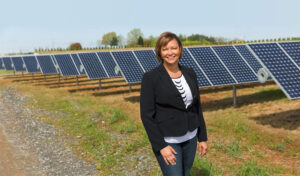Making Energy History: Three Black Women Who Are Changemakers in Clean Energy For All
This year, we celebrate the centennial anniversary of the 19th Amendment giving women the constitutional right to vote. A common thread throughout American history is the rising up and liberation of subjugated groups in search of equality and fair treatment. These hard-fought battles have led to greater participation in our democracy. We often hear about challenges people of color face and still do, in accessing the right to vote.
But what is truly forgotten are the stories, contributions, and challenges Black women have faced. The Civil Rights Movement was dominated by the faces of Black men, and the Women’s Suffrage Movement held little to no room at the microphone for Black women.
Even though women received the right to vote, this did not apply equally. It would be almost 50 years before all Black women could vote, due to the Jim Crow South with poll taxes and literacy tests. Often, we fail to understand the unique position black women hold, which is to both be seen equally for the color of our skin and respected for our gender identity.
America’s legacy of oppression and the structural racism that persists creates opportunity gaps throughout our society, including within the growing renewable energy economy. In 2019, about 8 percent of the solar workforce identified as Black and only 26 percent of the solar workforce identified as female.
It is imperative that companies and organizations move towards a more diverse workplace in terms of both race and gender. As we move through Black History Month, we must acknowledge and celebrate the contributions Black women have made to these spaces and particularly in the clean energy field. These three women have been leading the way towards a clean energy future with every community in mind.

- Hazel O’Leary, Former U.S. Secretary of Energy under the Clinton Administration
Secretary O’Leary was appointed to serve as the 7th United States Secretary of Energy from 1993 to 1997, making her both the first woman and first African American to hold the position. Early in her career, she worked as the director of the Federal Energy Administration’s Office of Consumer Affairs where she became known for representing the concerns of consumers who challenged the influence of large energy producers. As Secretary of Energy, she shifted resources towards renewable energy sources and was widely known for declassifying documents detailing how the United States was previously testing radiation on humans.

- Jessica O. Matthews, CEO and Founder of Uncharted Power
Jessica Matthews is the founder and CEO of Uncharted Power, a tech company building resilient, accessible and cost-effective power access through infrastructure. Jessica created the Soccket, a soccer ball that stores kinetic energy as its used, and with a half-hour of play can generate enough energy to power a small LED light for 3 hours. Through infrastructural solutions Uncharted Power plans to provide cost-efficient energy for the developing world. With Motion-based Off Grid Renewable Energy (MORE), Uncharted Power is leading the way to address the generation, transmission and storage issues many underserved communities face.

- Lisa Jackson, Vice President, Environment, Policy and Social Initiatives, Apple
As Apple’s Vice President of Environment, Policy and Social Initiatives, Lisa Jackson has overseen the company’s efforts to reduce their impact on the environment. From 2009 to 2013, under the Obama Administration, she served as administrator of the U.S. Environmental Protection Agency, where she focused on reducing greenhouse gases. She led the agency on the decision to classify greenhouse gases as pollutants and to begin limiting carbon pollution from power plants. Today, through her role at Apple, the company met their 100 percent renewable electricity goal in 2019, and has a new prototype robot named “Daisy” that can disassemble nine types of iPhones and sort the parts for recycling.
Women like these have helped to shape both the private and public energy sector. When we share pieces of history and lift up today’s leadership, we keep the American narrative alive and moving.
Learn More: Resources for Diversity, Equity, and Inclusion in Solar
Get resources from the NAACP, 100% Network, GRID Alternatives, Solar Energy Industries Association, the Solar Foundation, Vote Solar, and more partners:
> NAACP Just Energy Policies and Practices Action Toolkit
> 100% Network Building Blocks For Just Energy Policy
> Solar Industry Diversity Study
> Diversity Best Practices Guide for the Solar Industry

